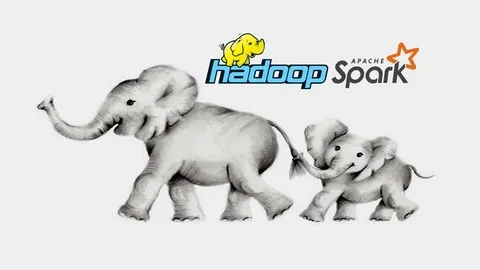
Big data Internship Program - Foundation 
This free course provides a comprehensive introduction to Big Data and Hadoop, offering a complete guide to learning the fundamentals of these technologies from the ground up. The Big Data Internship Program - Foundation is the perfect starting point for those looking to gain expertise in this field. ▼
ADVERTISEMENT
Course Feature
![]() Cost:
Cost:
Free
![]() Provider:
Provider:
Udemy
![]() Certificate:
Certificate:
No Information
![]() Language:
Language:
English
![]() Start Date:
Start Date:
Self Paced
Course Overview
❗The content presented here is sourced directly from Udemy platform. For comprehensive course details, including enrollment information, simply click on the 'Go to class' link on our website.
Updated in [March 06th, 2023]
This Big Data Internship Program - Foundation course provides students with the core knowledge necessary to become a successful big data practitioner. Through this course, students will gain an understanding of the fundamentals of big data, including data collection, storage, and analysis. They will also learn about the various tools and technologies used in the big data industry, such as Hadoop, Apache Spark, and NoSQL databases. Additionally, students will be introduced to the concepts of data mining, machine learning, and artificial intelligence. Finally, the course will cover the basics of data visualization and communication, as well as the ethical considerations of working with big data. Upon completion of this course, students will have the necessary skills to pursue a career in the big data industry.
[Applications]
After completing this course, students will be able to apply their knowledge of big data to a variety of contexts. They will be able to use their understanding of data analysis, data mining, and machine learning to develop and implement data-driven solutions. Additionally, they will be able to use their knowledge of data visualization to create meaningful insights from data. Finally, they will be able to use their knowledge of data engineering to design and build data pipelines and architectures.
[Career Paths]
1. Data Scientist: Data Scientists are responsible for analyzing large datasets to uncover trends and insights. They use a variety of tools and techniques to extract, clean, and process data, and then use statistical methods to interpret the data. Data Scientists are in high demand due to the increasing need for organizations to make data-driven decisions. As the demand for data-driven decisions increases, the need for Data Scientists will continue to grow.
2. Data Analyst: Data Analysts are responsible for collecting, organizing, and analyzing data to identify patterns and trends. They use a variety of tools and techniques to extract, clean, and process data, and then use statistical methods to interpret the data. Data Analysts are in high demand due to the increasing need for organizations to make data-driven decisions. As the demand for data-driven decisions increases, the need for Data Analysts will continue to grow.
3. Business Intelligence Analyst: Business Intelligence Analysts are responsible for analyzing data to identify patterns and trends that can be used to inform business decisions. They use a variety of tools and techniques to extract, clean, and process data, and then use statistical methods to interpret the data. Business Intelligence Analysts are in high demand due to the increasing need for organizations to make data-driven decisions. As the demand for data-driven decisions increases, the need for Business Intelligence Analysts will continue to grow.
4. Machine Learning Engineer: Machine Learning Engineers are responsible for developing and deploying machine learning models to solve complex problems. They use a variety of tools and techniques to extract, clean, and process data, and then use statistical methods to interpret the data. Machine Learning Engineers are in high demand due to the increasing need for organizations to make data-driven decisions. As the demand for data-driven decisions increases, the need for Machine Learning Engineers will continue to grow.
[Education Paths]
1. Bachelor's Degree in Computer Science: A Bachelor's Degree in Computer Science provides students with the foundational knowledge and skills needed to pursue a career in big data. This degree program covers topics such as programming, data structures, algorithms, software engineering, and database systems. Additionally, students will learn about the latest trends in big data, such as machine learning, artificial intelligence, and data mining.
2. Master's Degree in Data Science: A Master's Degree in Data Science provides students with the advanced skills and knowledge needed to become a successful big data practitioner. This degree program covers topics such as data analysis, data visualization, machine learning, and artificial intelligence. Additionally, students will learn about the latest trends in big data, such as predictive analytics, natural language processing, and deep learning.
3. Doctoral Degree in Big Data: A Doctoral Degree in Big Data provides students with the highest level of knowledge and skills needed to become a successful big data practitioner. This degree program covers topics such as data mining, data warehousing, distributed computing, and data security. Additionally, students will learn about the latest trends in big data, such as cloud computing, Internet of Things, and blockchain technology.
4. Big Data Internship Program: A Big Data Internship Program provides students with the opportunity to gain hands-on experience in the field of big data. This program covers topics such as data analysis, data visualization, machine learning, and artificial intelligence. Additionally, students will learn about the latest trends in big data, such as predictive analytics, natural language processing, and deep learning.
Course Syllabus
Welcome to Internship Course
Intro to Big Data Trunk
Project Overview
Pre-req of Unix Concepts
Quiz for Pre-req of unix
Unix Hand-ons Walk-through
Quiz Pre-req Unix Walk through
Pre-req Unix Commands
Introduction Java
Introduction Java
Data Types and Variables
Data Types and Variables
Java Control Statements
Java Control Statements
Overview Of OOPS Concepts
Overview Of OOPS Concepts
1 question
Instance Variable and Static Variable
Instance Variable and Static Variable
Inheritance
Inheritance
Abstract Classes and Interface
Abstract Classes and Interface
Access Modifiers
Access Modifiers
Wrapper Classes and Auto Boxing
Wrapper Classes and Auto Boxing
Collections
Collections
Generics Explaination using Stack Class Example
Generic Class and Its Type
Generic Class and Its Type
Introduction to Git
Quiz for Introduction to Git?
Getting Started With Git
Getting Started With Git
Git Hub
for Github
Git Repository
for Repository
Git Basic Commands
for Git basic commands
Git Operations
for Git operations
Steps of Cloudera Installation
Hands on Lab: Cloudera Installation
CDH Quickstart walk-through
Hue Walk-through
for Hue Walk-through
Introduction to Big Data/Big Data Overview
Introduction to Big Data/Big Data Overview
Big Data Foundation concepts through a Story
Roles in Big data
Roles in BIg data
Big Data Ecosystem
Bigdata ECO system:
Big Data Ecosystem after Spark
Bigdata ECO system after spark
Stages in Big data project
Stages in Bigdata Project
Big Data Distributions
Bigdata Distribution
Hand on Lab: Understanding HDFS
HDFS Quiz Question
Learn MapReduce in a Fun Way
Map Reduce Concept
MapReduce Code Dissection
MapReduce WordCount Job Lab Video
Hands On Lab: Map Reduce WordCount program
Map Reduce Core Concept
Map Reduce Core Concepts
Map Reduce Concept with Simple Example
Hadoop installation in windows10
Hadoop cluster performance tuning
Pros & Cons

Great course

Good refresher

Detailed explanation

Good presentation

Higherlevel language

Different lecturers

Volume issues

Muffled voice

Lack of examples

Illogical examples

Poorly explained concepts
Course Provider

Provider Udemy's Stats at AZClass
Big data Internship Program - Foundation equips students with the core knowledge needed to become successful big data practitioners. Learners will understand the fundamentals of big data, including data collection, storage, analysis, and visualization. They will also learn how to use various tools and techniques to process and analyze large data sets. Additionally, learners will learn about different types of data and how they can be used to create meaningful insights. Finally, learners will understand where big data is going and how they can apply it to their own projects.
Discussion and Reviews
5.0 (Based on 2 reviews)
- Tony2023-08-09Is Useful.
- annewang2023-06-29The course is very detailed and very useful.
Explore Similar Online Courses

Guide to DaVinci Resolve 16 Video Editing

Introduction to Natural Language Processing in Python

Python for Informatics: Exploring Information

Social Network Analysis

Introduction to Systematic Review and Meta-Analysis

The Analytics Edge

DCO042 - Python For Informatics

Causal Diagrams: Draw Your Assumptions Before Your Conclusions

Whole genome sequencing of bacterial genomes - tools and applications

Applied Data Science: An Introduction

Big Data Integration and Processing


Start your review of Big data Internship Program - Foundation